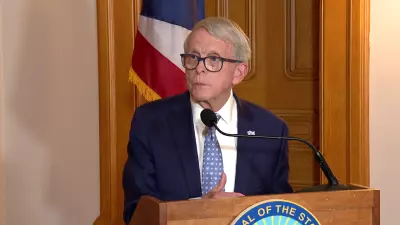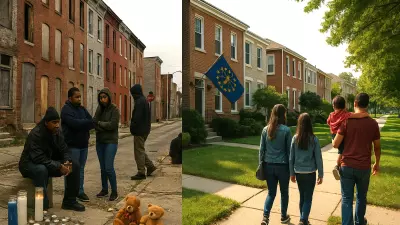Ohio Gov. Mike DeWine used his veto power to nix a provision that would have prevented funds from going to youth homeless shelters that house transgender youth, a program that would have created an non-chartered education savings account, and blocked compliance to a new higher education law from being tied to state funding.

DeWine signed the budget set to go into effect on Oct. 1. He issued 67 vetoes, the most during his time as governor.
The governor vetoed a provision that would have prohibited giving funds to youth homeless shelters that house transgender youth, even if they also serve youth who are not transgender.
“We want homeless shelters to be open and for everyone,” he said.
No Ohio youth should be turned away from a homeless shelter that receives state funds, DeWine wrote in his veto message.
“The reality is that a homeless child has been through a horrible experience and likely needs to be met where that child is at emotionally,” he wrote. “If a shelter has to call a homeless youth a pronoun that is incongruent with that youth’s gender to get that person into a shelter so the child won’t freeze to death, it needs to be done without fear of getting funding clawed back.”
Non-chartered Educational Savings Account Program
DeWine vetoed the non-chartered Educational Savings Account Program, which would have allowed students going to noncharted nonpublic schools to get state funding for tuition through an educational savings account.
These schools do not receive state or federal funds since they are not charted by the state.
“There’s no accountability,” DeWine said. “There’s no tax dollars.”
In his veto message, DeWine mentioned Bishop Sycamore, a former non-charted nonpublic school that pretended to have a football program in Columbus, but was ultimately discovered to be a scam in 2021.
“There is a lack of oversight and compliance mechanisms for NCNP schools in Ohio law and rule,” he wrote. “Without proper accountability, this item would risk taxpayer dollars on programs that may have compromised educational quality or that could risk student safety.”
The Ohio House added the provision to the budget, only to be taken out by the Senate, but it was brought back during conference committee.
Higher education
DeWine vetoed a provision that would have tied a portion of the State Share of Instruction to compliance with Ohio Senate Bill 1, a new higher education law banning diversity efforts, creates post-tenure reviews and an American civic literacy course, among other things.
Under the provision the Senate added to the budget, each university would have been required to submit a report showing compliance to the House and Senate higher education committees by March 1.
“This violates the separation of powers that is embedded in the framework of the Ohio Constitution that define the substance and scope of powers granted to the three branches of state government and intrudes upon the constitutional authority of the executive branch to distribute funds that have been appropriated through this budget bill,” DeWine wrote in his veto message.
The Ohio Department of Higher Education is able to determine compliance with the new law, DeWine wrote.
Drivers training
The budget raises the age that Ohio drivers must complete drivers training in order to get their license, from 18 to 21.
The law currently says only those under 18 years old must complete the driver’s education course and complete 50 hours of practice driving with a licensed driver. The Ohio House added that provision to the budget, only to be taken out by the Senate, but it was brought back during conference committee.
“We know that young people who go through driver’s training become safer drivers, safer for themselves and safer for everyone else on the road,” DeWine said.
The most dangerous group of drivers are 18-25 year olds, DeWine said.
“We have so many young people turning 18 never taking driver’s training,” he said. “In this budget, we’re protecting all Ohioans on the road. … We know that somebody who’s had driver’s training is statistically a better driver, and we know they’re less likely to kill somebody or kill themselves.”
Eye program
The budget creates the OhioSEE program, which will give school-aged kids comprehensive eye exams.
DeWine originally put this in his version of the budget and it was added back in during conference committee after the Senate took it out.
“Too many Ohio students fail a vision screening at their school, but then they never receive follow up eye care at all,” DeWine said. “Improving children’s vision will improve their success at school, which is a win for students, families and schools.”







